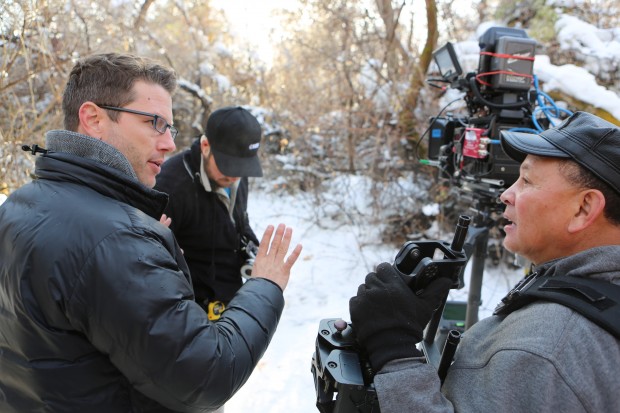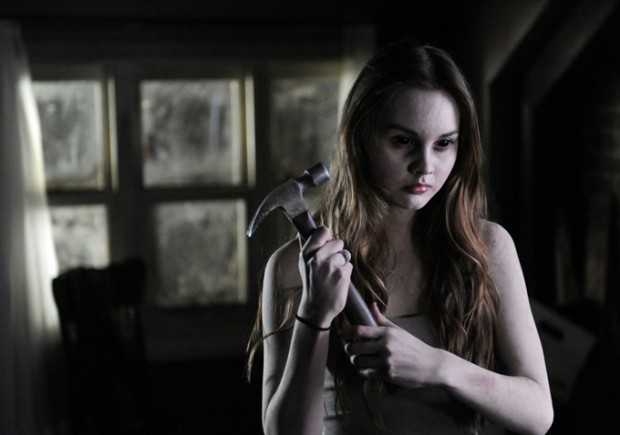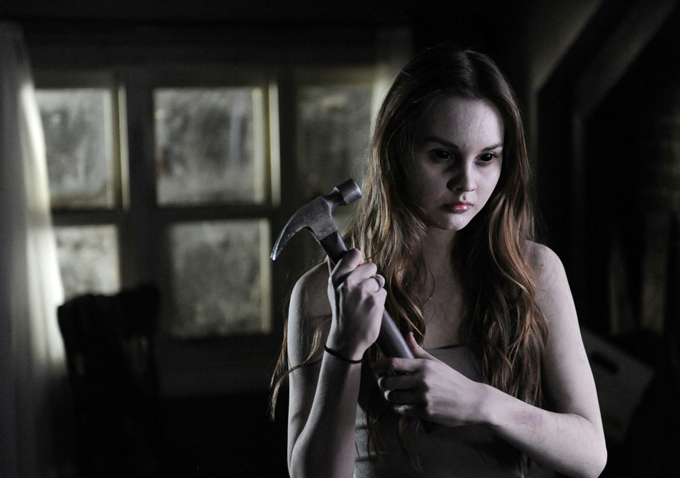
Amidst a glut of low-budget horror films, Haunt separates itself with its character-driven approach. With the horror title, which follows a teenager and neighbor exploring a nearby haunted house, now in theaters and on VOD, we had a conversation with film’s director, Mac Carter. The amount he speaks of working with his actors should give you the impression of how different a horror film Haunt is. Check out our conversation below.
The Film Stage: To start, are you a big horror fan? If so what are the trends you’ve noticed today? Does your film avert them?
Mac Carter: I am a big horror fan, of a certain type. I’ve long loved haunted house movies, going way, way back, to something called Something Evil, and then Burnt Offerings and The Changeling. I also like creature movies, but I don’t go too much for slasher films; they kind of get in my head a little so I tend to stay away from those. But as for the second part of your question, there is this resurgence of interest in ghost stories, haunted house movies, or of a more gothic and traditional type, and I really love that. But how does Haunt fit into that? It obviously does, and it’s obviously a crowded field out there, but we thought with Haunt when we read the draft that we had something special, especially with the characters at the centre of it, Evan and Sam.
I personally felt like I hadn’t seen a relationship like that in a horror film, and I wanted to focus on making that really compelling. I felt that if I could really get those characters to speak to an audience then they’d worry for them. Because if you don’t care for the characters, then the scares don’t really land, so it was really critical to work on that relationship at the centre of the film. I feel like that was what made Haunt special; it was something that I wasn’t seeing currently in the films out there. In terms of how it’s subversive? Well if you watched it all the way through then you know it gets pretty subversive [laughs] towards the end, it doesn’t flinch from the horror, and I appreciated that in the script, and I’m starting to hear that the audience appreciates that too.

Speaking of the characters, was there an appeal to making a horror film through the teenage perspective? Certainly it’s a trope but it can still be pretty interesting.
No question that it’s a trope, I mean I remember when a glut of these movies came out in the 80’s. But these are two troubled teens, and they’re kind of star-crossed, and I remember when I read it I was trying to describe the movie to friends as Romeo and Juliet meets a horror film and my friends talked me out of that description, but it kind of stuck with me, and that was what I felt would be really great about it. I happen to love directing talent at that age, where they haven’t really burst onto the scene, and yet they’re very eager to do a great job.
Very early on we had a superstar casting director named John Papsidera helping us out, who is Christopher Nolan’s casting director and has done many gigantic films. He got us great talent, Liana [Liberato] and Harrison [Gilbertson] are both amazing, and they were great kids to work with. I really love working with kids that age, and if I could get their relationship to be something that felt a little bit honest, a bit tender, and not jaded; that had a teen perspective, it would be really exciting for an audience. I’ll tell you that once you get into your 20’s, there’s a different requirement for a horror film, you pretty much have to go hard-R to bring out 20/30 year olds who want to see horror films. So when you’re working at teenage, like 16/17/18, you can afford to be a little more romantic, the character development can be a little bit stronger.
You mentioned the younger actors, how different is your approach to directing them than more seasoned members of the cast like Jacki Weaver and Ione Skye?
I found across the board the cast was really interested in trying to create believable characters who were in unbelievable circumstances. With Ione she’s incredibly grounded and sweet, and really hooked into the mother role; there was really no struggle with her, it was a smaller role but she’s just so good at that kind of thing. Jacki is this very soft-spoken, very sweet, very gentle actress with this really dark sense of humour. And I think that’s what intrigued her about the role was that mixed in her personality, and I think you see that come across. With an actress like Jacki I obviously have a lot of trust, because I know her work, but that doesn’t mean we didn’t have conversations about the different scenes, we did of course but I had a lot of trust in what she was doing. I think when you’re working with younger actors, I feel like I have to be very protective of them, giving them the time and space to work on their performance, and work on their own ideas of how the characters should react, it was very much a partnership of going back and forth and talking about it.
It’s one of the reasons I asked John Papsidera, the casting director, to cast at the age of the characters, because I wanted them to be truly of that age, so they would be bringing all of their own foibles of those years to the part. So there was a lot of attention to giving them the space to do their work. It was a summertime movie, and there was a skinny-dipping scene at a pool, and we got hit by a snow-storm, so it suddenly turned into a winter movie, and we tried to get the temperature of the pool up to the point where the kids could actually jump in, and we got it up to about 40 degrees, and they still wanted to jump into it. They told me they wanted to do it, they had to do it, it was really important to their characters, they have this kind of sexual moment that ends up creating a bond, it’s going to make their relationship even that more potent, so let us jump in the pool, let us jump in the pool! And they were really convincing, so I said okay I’m going to let you jump in the pool, and sure enough the producers came over and pulled the plug very smartly, and said are you kidding, you’ll have teenagers with pneumonia, we’ll never get through the rest of this shoot! But that’s how committed the kids were.

Do you see yourself solely as a director, or you interested in writing future films as well?
Before I made a documentary at DC, I created my own comic book called The Strange Adventures of H.P. Lovecraft published by Image Comics. Obviously I’m a huge fan of horror movies, but also horror literature, so I really love Lovecraft’s writing, so I created this comic-book based around him as a main character. And I thought this was going to be a movie that I might make, and I tried to develop it, thinking I might direct. I took it around town, and Ron Howard wanted to do it. So he took the project away from me [laughs] but my caveat was that I’d write the first draft, so I did that, but I gave it away to a much more accomplished screenwriter, John August, and it kind of got longed down there at Universal, and it eventually gave way to The Dark Tower, which Ron Howard was interested in doing for a while, so now it’s back with me. So I’ve always had that interest in writing and directing, I’d love to direct my own material, so I hope I can do it and I hope it’s The Strange Adventures of H.P. Lovecraft.
Haunt is now in theaters and on VOD.

